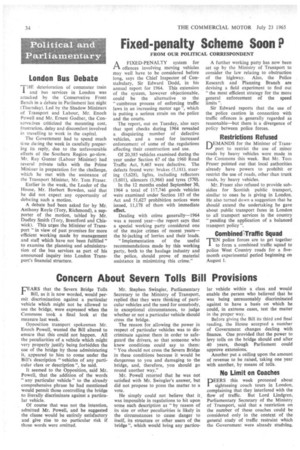Concern About Severn Tolls Bill Provisions
Page 36

If you've noticed an error in this article please click here to report it so we can fix it.
rEARS that the Severn Bridge Tolls Bill, as it is now worded, would permit discrimination against a particular vehicle which might not be allowed to use the bridge, were expressed when the Commons took a final look at the measure last week.
Opposition transport spokesman Mr. Enoch Powell, wanted the Bill altered to ensure that this could not happen. All the peculiarities• of a vehicle which might very properly justify being forbidden the use of the bridge by those administering it, appeared to him to come under the Bill's description "vehicles of any particular class or description ", he said.
It seemed to the Opposition, said Mr. Powell, that the addition of the words "any particular vehicle" to the already comprehensive phrase he had mentioned would permit those controlling the bridge to literally discriminate against a particular vehicle.
Of course that was not the intention, admitted Mr. Powell, and he suggested the clause would be entirely satisfactory and give rise to no particular risk if those words were omitted. Mr. Stephen Swingler, Parliamentary Secretary to the Ministry of Transport, replied that they were thinking of particular vehicles and the need for somebody, in exceptional circumstances, to judge whether or not a particular vehicle should cross the bridge.
The reason for allowing the power in respect of particular vehicles was to discriminate against them in order to safeguard the drivers, so that someone who knew conditions could say to them: "You should not cross the Severn Bridge in these conditions because it would be dangerous to you and damaging to the bridge, and, therefore, you should go round another way."
Mr. Powell retorted that he was not satisfied with Mr. Swingler's answer, but did not propose to press the matter to a vote.
He simply could not believe that it_ was impossible in regulations to hit upon some such description as " by reason of its size or other peculiarities is likely in the circumstances to cause danger to itself, its structure or other users of the bridge ", which would bring any particu
lar vehicle within a class and would enable the person who believed that he was being unreasonably discriminated against to have a basis on which he could, in extreme cases, test the matter in the proper way.
Before giving the Bill its third and final reading, the House accepted a number of Government changes dealing with finance. One provided that the power to levy tolls on the bridge should end after 40 years, though Parliament could approve extensions.
Another put a ceiling upon the amount of revenue to be raised, taking one year with another, by means of tolls.
No Limit on coaches
DEERS this week protested about sightseeing coach tours in London, complaining that they interfered with the flow of traffic. But Lord Lindgren, Parliamentary Secretary of the Ministry of Transport, said that a restriction on the number of these coaches could be considered only in the context of the general study of traffic restraint which the Government were already studying.




























































































































